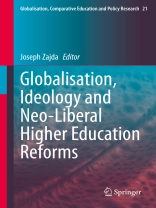This book sets out to examine the neo-liberal dimensions of globalisation and market-driven economic imperatives that have impacted higher education reforms. It critiques the notions of accountability, efficiency, academic capitalism, quality of education, and the market-oriented and entrepreneurial university model, based on a neo-liberal ideology. The expansion of economic rationality into the educational sector is one the most ubiquitous dimensions of neo-liberalism and one of its most powerful ideological tools, resulting in the commodification, commercialization, and marketization of education and knowledge. The book critiques structural changes in education and the impact of neo-liberalism and globalisation on educational systems around the world. With this as its overall focus, the respective chapters present hand-picked scholarly research on major discourses in the field of global neo-liberal education reforms.
The book draws upon recent studies in the areas of globalisation, neo-liberal education reforms, and the role of the state. It critically assesses the neo-liberal ideological imperatives of current education and policy reforms and illustrates how these shifts in the relationship between the state and education policy are shaping current trends in education policy reform outcomes. Taken together, the chapters offer a timely analysis of current issues affecting neo-liberal education policy research, and outline future directions that education and policy reforms could take.
विषयसूची
1 Current Research Trends in Globalisation and Neo-Liberalism in Higher Education.- 2 Neo-liberalism in a globalized world: The case of Canada.- 3 Globalization, Nationalism, and Inclusive Education for All: A Reflection on the Ideological Shifts in Education Reform.- 4 Globalisation and Neo-liberalism in Higher Education.- 5 Neoliberal Education: A new citizenship education in a globalised world? Comparing citizenship education in Singapore and Australia.- 6 Neo-liberalism and configuring global citizenship in higher education: Outbound Mobility Programs.- 7 Violence and the Crisis of Meaning in a Neo-Liberal World.- 8 Globalisation, Neoliberalism and Laissez-Faire: The Retreat from Naturalism.- 9 Globalisation and Neo-Liberal Higher Education Reforms.- 10 Research on globalisation and neo-liberalism in higher education.
लेखक के बारे में
Joseph Zajda is an Associate Professor at the Faculty of Education and Arts, Australian Catholic University (Melbourne Campus). He has written and edited 42 books and over 150 book chapters and articles on globalisation and education policy, higher education and curriculum reforms. He is also the editor of the 24-volume book series Globalisation, Comparative Education and Policy Research (Springer, 2009 & 2020). Recent publications include: Zajda, J. (2018).
Globalisation and education reforms: Paradigms and ideologies Dordrecht: Springer; Zajda, J. (2017).
Globalisation and national identity in history textbooks. Dordrecht: Springer; Zajda, J. & Rust, V. (Ed.) (2016).
Globalisation and Higher Education Reforms. Dordrecht: Springer; Zajda, J. (2015). (Ed.).
Second International Handbook of Globalisation, Education and Policy Research. Dordrecht: Springer.
Prof Zajda’s works can be found in 480 publications in 4 languagesand 10, 529 university library holdings globally. He was awarded an ARC Discovery Grant ($315, 000) (with Monash University, 2011–2015) for globalising studies of the politics of history education. Further, he is an elected fellow of the Australian College of Educators (FACE).












